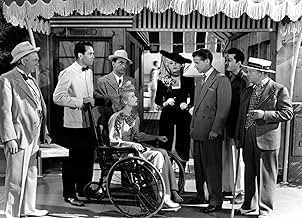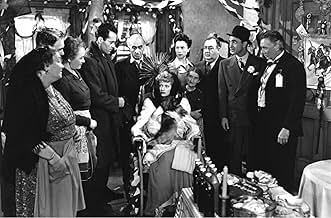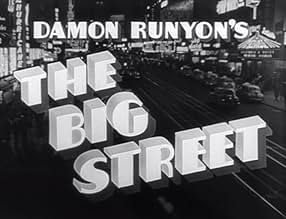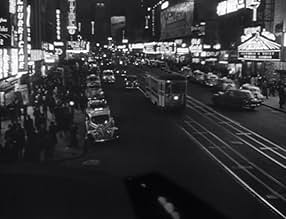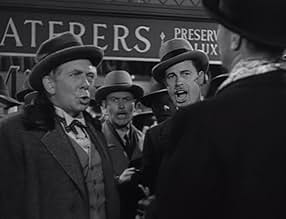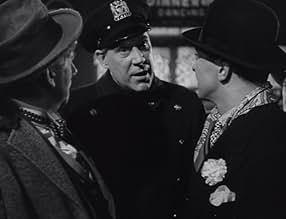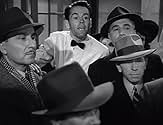NOTE IMDb
6,4/10
1,8 k
MA NOTE
Ajouter une intrigue dans votre langueA busboy in unrequited love with a nightclub performer grows closer to her after she is paralyzed in an attack by her gangster boyfriend.A busboy in unrequited love with a nightclub performer grows closer to her after she is paralyzed in an attack by her gangster boyfriend.A busboy in unrequited love with a nightclub performer grows closer to her after she is paralyzed in an attack by her gangster boyfriend.
- Réalisation
- Scénario
- Casting principal
- Récompenses
- 2 victoires au total
William T. Orr
- Decatur Reed
- (as William Orr)
Don Barclay
- Eating Contest Emcee
- (non crédité)
Mary Bayless
- Nightclub Patron
- (non crédité)
Louise Beavers
- Ruby - Gloria's Maid
- (non crédité)
Anthony Blair
- O'Rourke
- (non crédité)
Avis à la une
Broadway busboy Henry Fonda (as Agustus "Little Pinks" Pinkerton) idolizes self-centered lounge singer Lucille Ball (as Gloria "Your Highness" Lyons). When Ms. Ball falls on hard times, Mr. Fonda gets to lend a helping hand. The pair move to Florida, but tragedy follows
Although "Guys and Dolls" (1955) remains most representative, "The Big Street" captures the spirit of writer Damon Runyon's characters better than most Hollywood efforts, probably because Mr. Runyon produced.
They weren't the author's first choice for the leads, but Fonda's innocent charmer and Ball's selfish tragedienne are exemplary characterizations. Ball is especially noteworthy, as she did not receive many opportunities to play against type, and places herself squarely on par with the more successful "Golden Age:" actresses of the 1930s and 1940s; she is startling. Director Irving Reis coordinates his fine cast and crew very well, making camera angles and movement seem uncommonly fresh.
******** The Big Street (8/13/42) Damon Runyon : Irving Reis ~ Lucille Ball, Henry Fonda, Agnes Moorehead, Eugene Palette
They weren't the author's first choice for the leads, but Fonda's innocent charmer and Ball's selfish tragedienne are exemplary characterizations. Ball is especially noteworthy, as she did not receive many opportunities to play against type, and places herself squarely on par with the more successful "Golden Age:" actresses of the 1930s and 1940s; she is startling. Director Irving Reis coordinates his fine cast and crew very well, making camera angles and movement seem uncommonly fresh.
******** The Big Street (8/13/42) Damon Runyon : Irving Reis ~ Lucille Ball, Henry Fonda, Agnes Moorehead, Eugene Palette
"The Big Street" was not a major hit when first released but the critics at the time all noted Lucille Ball's superb star-making performance as one of the all-time nastiest women ever to reach the big screen. Lucy was already a minor star thanks to a string of popular B-grade comedies and dramas but this film cemented her stardom and brought her to MGM where she reached an early peak the next year. The film is sentimental and does have some plot points that have to be swallowed but Ball's great acting and chemistry with a splendid Fonda makes this tale of unrequited love work. Fonda plays a kind innocent busboy who falls madly in-love with a crippled chanteuse(Ball). The last scene on the dance floor is unforgettable. Why RKO did not get Lucy an Oscar nomination for this performance is a crime. All the critics at the time hailed her work in this but it just slipped under the rug when the film posted only small profits. This was the kind of role Bette Davis made her own but Ball does it without Davis' habit of falling into mannerisms. Agnes Moorehead is also excellent as Fonda's concerned friend. Beautiful cinematography makes Ball look incredible in her close-ups. Worth a look but overlook the occasional mawkish elements. Lucy makes it a must.
For fans of Lucy, Ball's role here takes real getting used to. "Her Highness" character is shrewish and generally not very likable. Ball does, however, get to show some very real chops outside her usual comedic range. As a result, I've got a new appreciation of her as an actress as well as a comedienne.
The movie itself is undermined by a weak central focus. Neither Ball's Her Highness nor Fonda's servile bus boy is easy to identify with. Thus, it's hard to sympathize with the overbearing HH even after she's crippled. Nor is Little Pink's (Fonda) utterly selfless devotion understandable given the imperious way she treats him. As a result, the movie's core flounders. A charitable view might take the movie as a fairy tale where the unlikely bus boy, a prince in his sudden formal wear, rescues the crippled princess if only for a moment.
Of course, being a Damon Runyon creation, there's the usual number of street-smart Broadway mugs. So the margins shine with such colorful types as Palette, Levene, Collins, et al. Also, catch dragon lady Agnes Moorehead in a rare sympathetic role (Shumberg); plus premier eccentric Hans Conreid as the grumpy headwaiter. And for folks interested in 50's TV, there's Wm. T. Orr as handsome socialite Decatur Reed. This is the same Orr who produced many of the popular hour-long TV shows of the late 50's, such as Maverick, 77 Sunset Strip, Lawman, et al. I've seen his name for years, never thinking he might show up on screen.
All in all, the only reason to catch this 80-minute pastiche is for Lucy's surprising performance and the colorful peripheral characters. Otherwise, it's pretty forgettable, especially for fans of Fonda.
The movie itself is undermined by a weak central focus. Neither Ball's Her Highness nor Fonda's servile bus boy is easy to identify with. Thus, it's hard to sympathize with the overbearing HH even after she's crippled. Nor is Little Pink's (Fonda) utterly selfless devotion understandable given the imperious way she treats him. As a result, the movie's core flounders. A charitable view might take the movie as a fairy tale where the unlikely bus boy, a prince in his sudden formal wear, rescues the crippled princess if only for a moment.
Of course, being a Damon Runyon creation, there's the usual number of street-smart Broadway mugs. So the margins shine with such colorful types as Palette, Levene, Collins, et al. Also, catch dragon lady Agnes Moorehead in a rare sympathetic role (Shumberg); plus premier eccentric Hans Conreid as the grumpy headwaiter. And for folks interested in 50's TV, there's Wm. T. Orr as handsome socialite Decatur Reed. This is the same Orr who produced many of the popular hour-long TV shows of the late 50's, such as Maverick, 77 Sunset Strip, Lawman, et al. I've seen his name for years, never thinking he might show up on screen.
All in all, the only reason to catch this 80-minute pastiche is for Lucy's surprising performance and the colorful peripheral characters. Otherwise, it's pretty forgettable, especially for fans of Fonda.
This interesting story failed to make it big with audiences in its initial release, but is actually a noteworthy picture, nonetheless. This unlikely story has Henry Fonda as Little Pinks, a shy, timid busboy, who's obsessed with Lucille Ball's self-absorbed, mean-spirited torch singer. Despite her poor treatment of him, he continues to worship her. During an argument with her louse of a boyfriend, he (the boyfriend) pushes her down a flight of stairs. Paralyzed and desperate, Gloria moves in with Pinks. The wheelchair-bound diva alienates everyone around her with her anger and venomous commentary. But Pinks doesn't let it bother him. Instead the "odd couple" go on an unusual roadtrip together. He pushes her in her wheelchair all the way to Miami - pretty dumb, really !
Ball is excellent, and in top form. It's great to see her in such an unusual role (see also 1947's "Lured"). Fonda is great, too, as the innocent and smitten young man. And the rest of the cast is good; especially, the always fabulous Agnes Moorehead. Despite a good story and an excellent cast, the plot limps along at points, and the shoddy production value is unignorable. Plus, the whole "Let's push Lucy to Florida in her wheelchair" thing is utterly nuts! However, the final scene is an unforgettable melodramatic moment that is fascinating just for the fact that Ball is the center of it. It makes it worth sitting through the many drawbacks of this film just to see the ending scene.
Ball is excellent, and in top form. It's great to see her in such an unusual role (see also 1947's "Lured"). Fonda is great, too, as the innocent and smitten young man. And the rest of the cast is good; especially, the always fabulous Agnes Moorehead. Despite a good story and an excellent cast, the plot limps along at points, and the shoddy production value is unignorable. Plus, the whole "Let's push Lucy to Florida in her wheelchair" thing is utterly nuts! However, the final scene is an unforgettable melodramatic moment that is fascinating just for the fact that Ball is the center of it. It makes it worth sitting through the many drawbacks of this film just to see the ending scene.
Years before Damon Runyon got Broadway and screen immortality with Guys and Dolls, one of his short stories was adapted for the silver screen concerning the unrequited love of a bus boy for a Broadway entertainer. That story was The Big Street and the title is named for the street that Runyon chronicled, Broadway.
Though The Big Street got good reviews for its stars Henry Fonda and Lucille Ball, the subject matter was way too much of a downer for mass audience appeal. The plot as it is tells the story of Little Pinks who is madly in love with this nightclub entertainer who being the mistress of gangster Barton MacLane, can't see him for beans and wouldn't look up from the table to try.
That all changes when MacLane slaps her so hard she falls down a flight of stairs and becomes paralyzed. All abandon her then and in truth she didn't exactly near and endear herself to too many. That is except for Fonda and the Broadway characters he lines up to give her a helping hand.
A movie like The Big Street could not be made today because we don't have the rich assortment of character players to entertain us. The people Damon Runyon created were made for such performers as Sam Levene, Ray Collins, Millard Mitchell, etc. And of course the two best performers who steal the film from the leads when they're on are Agnes Moorehead and Eugene Palette. Moorehead didn't do too much comedy and her gift for it would not be tapped again until she was Endora in Bewitched.
Lady for a Day and Guys and Dolls enjoyed much greater success because they were done in a comic vein. My guess is that is what people expect when they see Damon Runyon on a theater program credit.
Still The Big Street is nicely-nicely done as Eugene Palette and Stubby Kaye would say.
Though The Big Street got good reviews for its stars Henry Fonda and Lucille Ball, the subject matter was way too much of a downer for mass audience appeal. The plot as it is tells the story of Little Pinks who is madly in love with this nightclub entertainer who being the mistress of gangster Barton MacLane, can't see him for beans and wouldn't look up from the table to try.
That all changes when MacLane slaps her so hard she falls down a flight of stairs and becomes paralyzed. All abandon her then and in truth she didn't exactly near and endear herself to too many. That is except for Fonda and the Broadway characters he lines up to give her a helping hand.
A movie like The Big Street could not be made today because we don't have the rich assortment of character players to entertain us. The people Damon Runyon created were made for such performers as Sam Levene, Ray Collins, Millard Mitchell, etc. And of course the two best performers who steal the film from the leads when they're on are Agnes Moorehead and Eugene Palette. Moorehead didn't do too much comedy and her gift for it would not be tapped again until she was Endora in Bewitched.
Lady for a Day and Guys and Dolls enjoyed much greater success because they were done in a comic vein. My guess is that is what people expect when they see Damon Runyon on a theater program credit.
Still The Big Street is nicely-nicely done as Eugene Palette and Stubby Kaye would say.
Le saviez-vous
- AnecdotesLucille Ball's favorite of her films. She felt her performance was unjustly ignored by the Academy of Motion Picture Arts and Sciences (AMPAS).
- GaffesA gathering to raise money to send Gloria Lyons to Florida doesn't raise enough, so a suggestion is made to put it on a horse. A face-on shot of Horsethief shows him sitting down and pulling a paper from his inside pocket. He stands up and unfolds the paper, but then a long shot shows him just starting to take the paper from his pocket.
- Citations
Gloria Lyons: Love is something that gets you one room, two chins and 3 kids.
- Crédits fousOpening credits: "Loser's Lane --- the sidewalk in front of Mindy's Restaurant on Broadway-- is not as high-toned a trading center as Wall Street, but the brokers are a lot more colorful. Generally they prefer to put their money on a prizefight or horserace, but when the action slows, anything can happen and it usually does. Tonight, for example, the citizens of the Lane are discussing the latest contest in their usual quiet way --"
- ConnexionsFeatured in AFI Life Achievement Award: A Tribute to Henry Fonda (1978)
- Bandes originalesWho Knows?
(1942)
Lyrics by Mort Greene
Music by Harry Revel
Performed by Lucille Ball at the New York nightclub (uncredited)
Reprised by her with Ozzie Nelson and Orchestra at the Florida nightclub (Vocals for Miss Ball by Martha Mears) (uncredited)
Played often in the score
Meilleurs choix
Connectez-vous pour évaluer et suivre la liste de favoris afin de recevoir des recommandations personnalisées
- How long is The Big Street?Alimenté par Alexa
Détails
- Date de sortie
- Pays d’origine
- Langue
- Aussi connu sous le nom de
- The Big Street
- Lieux de tournage
- Miami, Floride, États-Unis(second unit - exteriors)
- Société de production
- Voir plus de crédits d'entreprise sur IMDbPro
- Durée1 heure 28 minutes
- Couleur
- Rapport de forme
- 1.37 : 1
Contribuer à cette page
Suggérer une modification ou ajouter du contenu manquant


